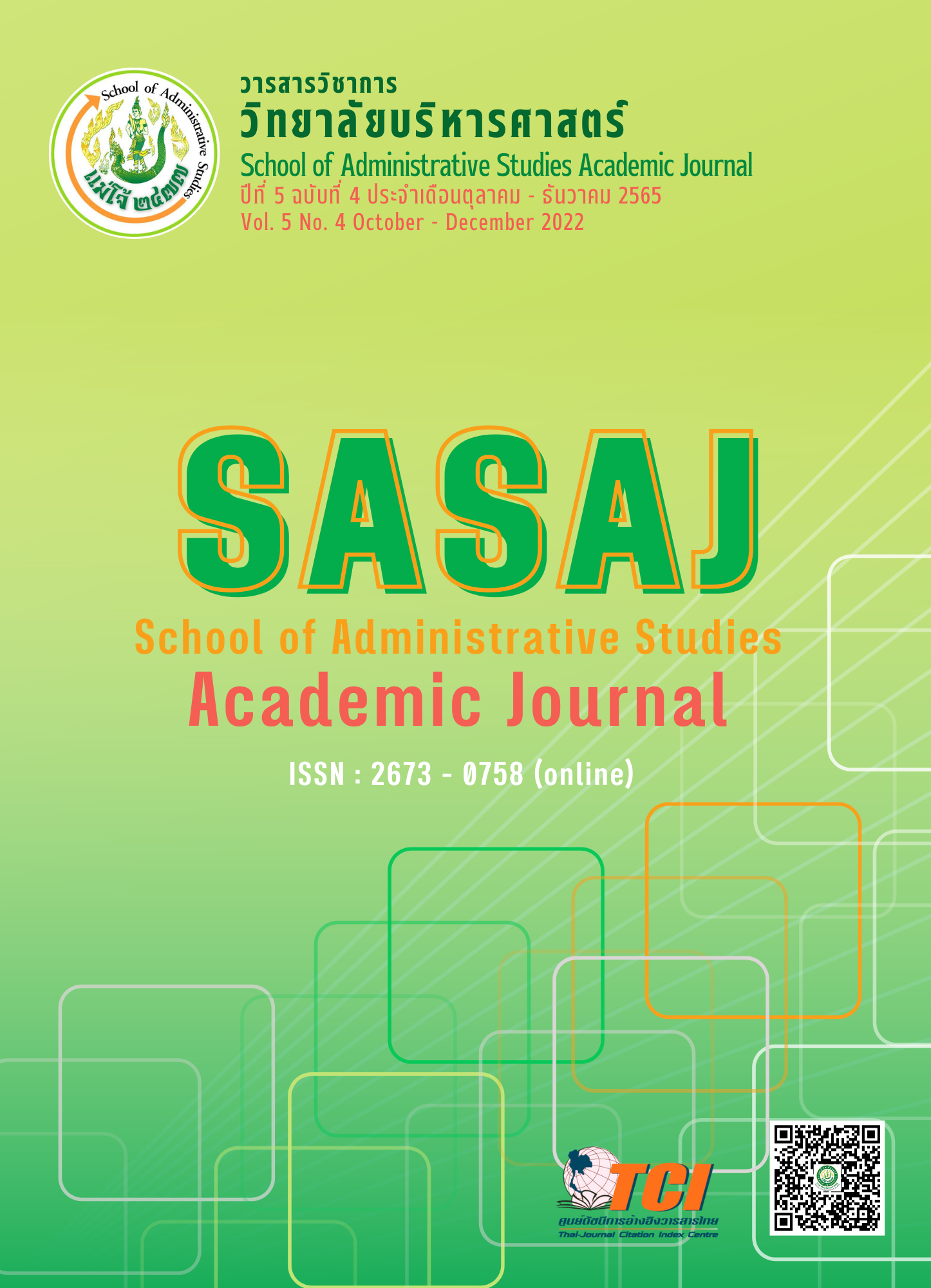กลยุทธ์การส่งเสริมบรรษัทภิบาลเพื่อการจัดการอย่างยั่งยืนขององค์กรธุรกิจขนาดใหญ่ในสาธารณรัฐประชาธิปไตยประชาชนลาว
Main Article Content
บทคัดย่อ
การศึกษานี้มีวัตถุประสงค์เพื่อศึกษากลยุทธ์การส่งเสริมบรรษัทภิบาลเพื่อการจัดการอย่างยั่งยืนขององค์กรธุรกิจขนาดใหญ่ในสาธารณรัฐประชาธิปไตยประชาขนลาว ผู้วิจัยได้ใช้กระบวนทัศน์การวิจัยแบบสร้างสรรค์นิยมและใช้ยุทธศาสตร์การวิจัยแบบศึกษาปรากฏการณ์ เครื่องมือที่ใช้ในการวิจัย คือ แบบสัมภาษณ์ โดยสัมภาษณ์เชิงลึกกับผู้ให้ข้อมูลสำคัญ ได้แก่ กลุ่มผู้รับผิดชอบในหน่วยงานที่เกี่ยวข้องกับการส่งเสริมบรรษัทภิบาล กลุ่มผู้ประกอบการ ผู้บริหารของบริษัทที่จดทะเบียนในตลาดหลักทรัพย์และองค์กรธุรกิจขนาดใหญ่และกลุ่มนักวิชาการที่ปรึกษาองค์กรธุรกิจ โดยใช้วิธีคัดเลือกแบบเจาะจง จำนวน 18 คน และทำการตรวจสอบข้อมูลที่รวบรวมได้แบบสามเส้าเพื่อให้มีความน่าเชื่อถือมากขึ้น
ผลการวิจัยพบว่า กลยุทธ์การส่งเสริมบรรษัทภิบาลเพื่อการจัดการอย่างยั่งยืน แบ่งออกได้เป็น 2 กลยุทธ์หลัก และ 4 กลยุทธ์ย่อย โดยกลยุทธ์หลักประกอบด้วย 1) กลยุทธ์ด้านการกำกับดูแลและส่งเสริมบรรษัทภิบาล ได้แก่ กลยุทธ์ย่อยที่ 1 การยกระดับความมุ่งมั่นในการบริหารจัดการตามหลักบรรษัทภิบาล กลยุทธ์ย่อยที่ 2 การเสริมสร้างความรู้ ความเข้าใจด้านบรรษัทภิบาลแก่ผู้มีส่วนได้ส่วนเสีย 2) กลยุทธ์การป้องกัน การกำกับ และติดตามการดำเนินงานด้านบรรษัทภิบาล ได้แก่ กลยุทธ์ย่อยที่ 3 การสร้างการมีส่วนรวมของผู้มีส่วนได้ส่วนเสียในกระบวนการและกลไกการเปิดเผยข้อมูลความโปร่งใสการเฝ้าระวัง ติดตาม ตรวจสอบอย่างมีประสิทธิภาพ และกลยุทธ์ย่อยที่ 4 การเพิ่มประสิทธิภาพในการบริหารจัดการที่ดีและการนำองค์กร ทั้งนี้การขับเคลื่อนกลยุทธ์การส่งเสริม บรรษัทภิบาลเพื่อการจัดการอย่างยั่งยืนให้เกิดประสิทธิผลได้นั้น ผู้บริหารต้องมีความเป็นผู้นำและดำเนินการเชิงรุก คณะกรรมการบริษัทมีความมุ่งมั่นและเป็นแบบอย่างที่ดีในด้านบรรษัทภิบาล บุคลากรต้องมีความความรู้และตระหนักในเรื่องการกำกับดูแลกิจการที่ดี นโยบายและระบบสนับสนุนด้านบรรษัทภิบาลต้องสอดคล้องกับสภาพและศักยภาพขององค์กรด้วย
Article Details

อนุญาตภายใต้เงื่อนไข Creative Commons Attribution-NonCommercial-NoDerivatives 4.0 International License.
ลิขสิทธิ์
เอกสารอ้างอิง
หมอนแก้ว จิตตะลาด, และ ศิริพันธุ์ จุรีมาศ. (2565). กลยุทธ์การจัดการทรัพยากรมนุษย์ของธุรกิจพลังงานไฟฟ้าในสาธารณรัฐประชาธิปไตยประชาชนลาว. วารสารวิชาการวิทยาลัยบริหารศาสตร์, 5(2), 81-95.
Aguilera, R. V., & Jackson, G. (2010). Comparative and international corporate governance. The Academy of Management Annals, 4(1), 485-556. doi: https://doi.org/10.5465/19416520.2010.495525
Allen, F., & Gale, D. M. (2002). A comparative theory of corporate governance. Wharton Financial Institutions Center.
Al-Matari, E.M., Al-Swidi, A.K., & Fadzil, F. (2014). The measurements of firm performance’s dimensions. Asian Journal of Finance and Accounting, 6(1), 24-49.
Blackburn, W. R. (2008). The sustainability handbook: The complete management guide to achieving social, economic and environmental responsibility. Washington D.C.: Environmental Law Institute.
Brown, L. D., & Caylor, M. L. (2004). Corporate governance and firm performance. Journal of Accounting and Public Policy, 25(4), 409-434.
Chowdary, N. V. (2002). Corporate governance: Principles and paradigms. Hyderabad, India: Institute of Chartered Financial Analysts of India.
Cochran, P., & Wartick, S. (1988). Corporate governance: A review of the literature. Morristown. New Jersey: Financial Executives Research Foundation.
Feleaga, N., Feleaga, L., Dragomir, V. D., & Bigioi, A. D. (2011). Corporate governance in emerging economies: The case of Romania. Theoretical and Applied Economics, 9(9), 5-16.
Freeman, N. (2002). Foreign direct investment in Cambodia, Laos and Vietnam: A regional overview. Retrieved from https://www.imf.org/~/media/Websites/IMF/imported-events/external/pubs/ft/seminar/2002/fdi/eng/pdf/_freemapdf.ashx
Global Reporting Initiatives (GRI). (2013). The external assurance of sustainability reporting: Global reporting initiative. The Netherlands, Amsterdam: Global Reporting Initiatives.
Goodwin, J., & Seow, J. L. (2000). Corporate governance in Singapore: Perceptions of investors, directors and auditors. Accounting and Business Review, 7(1), 39-68.
International Finance Corporation (IFC). (2011). Climate investment opportunities in emerging markets: An IFC analysis. Washington, DC: World Bank.
Jensen, M. C., & Chew, D. (1995). US Corporate governance: Lessons from the 1980's. New York, NY: Harvard University Press.
Kole, J., & Lehn, S. (1998). Corporate governance and board effectiveness. Journal of Banking and Finance, 22(4), 371-403.
Krosinsky, C., Robin, N., & Viederman, S. (2012). Evolutions in sustainable investment strategies, funds & thought leadership. New Jersey: John Wiley and Sons.
Lubin, D. A., & Esty, D. C. (2010). The sustainability imperative. Harvard Business Review, 88(5), 42-50.
Miller, T., Kim, A. B., Roberts, J. M., Riley, B., & Whiting, T. (2017). 2017 Index of economic Freedom. Washington, D.C.: The Heritage Foundation.
Miller, T., Kim, A. B., Roberts, J. M., Tyrrell, P., & Whiting, T. K. (2018). 2018 Index of economic freedom. Washington, D.C.: The Heritage Foundation.
Nguyen, V., & Nguyen, A. (2016). Corporate governance structures and performance of firms in Asian markets: A comparative analysis between Singapore and Vietnam. Organizations and Markets in Emerging Economies, 7(2), 112-140.
Oman, C. P. (2001). Corporate governance and national development. An Outgrowth of the OECD Development Centers Experts Workshop in 2000 and Informal Policy Dialogue in 2001.
Organisation for Economic Co-operation and Development, (1999). OECD principles of corporate governance. Paris: OECD.
Ormazabal, G. (2018). The role of stakeholders in corporate governance: A view from accounting research. Foundations and Trends® in Accounting, 11(4), 193-290.
Porter, M. E. (1985). The competitive advantage: Creating and sustaining superior performance. New York: Free Press.
Rothstein, B., & Teorell, J. (2008). What is quality of government? A theory of impartial government institutions. Governance, 21(2), 165-190.
Shaikh, I. (2022). Environmental, social, and governance (ESG) practice and firm performance: An international evidence. Journal of Business Economics and Management, 23(1), 218-237.
Solomon, J., & Solomon, A. (2004). Corporate governance and accountability. New York: John Wiley.
Stanley, A. C. (2006). Strategic planning: A practical guide for competitive success. California: Thomson South West.
The World Bank Group. (2018). Ease of doing business in Lao PDR 2018. Retrieved form http://www.doingbusiness.org/data/exploreeconomies/lao-pdr
Tricker, B. (2015). Corporate governance, principles, policies and practices. Oxford: University Press.
World Business Council Sustainability Development. (2000). Eco-efficiency: Creating more value with less impact. North Yorkshire, UK: WBCSE.


